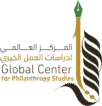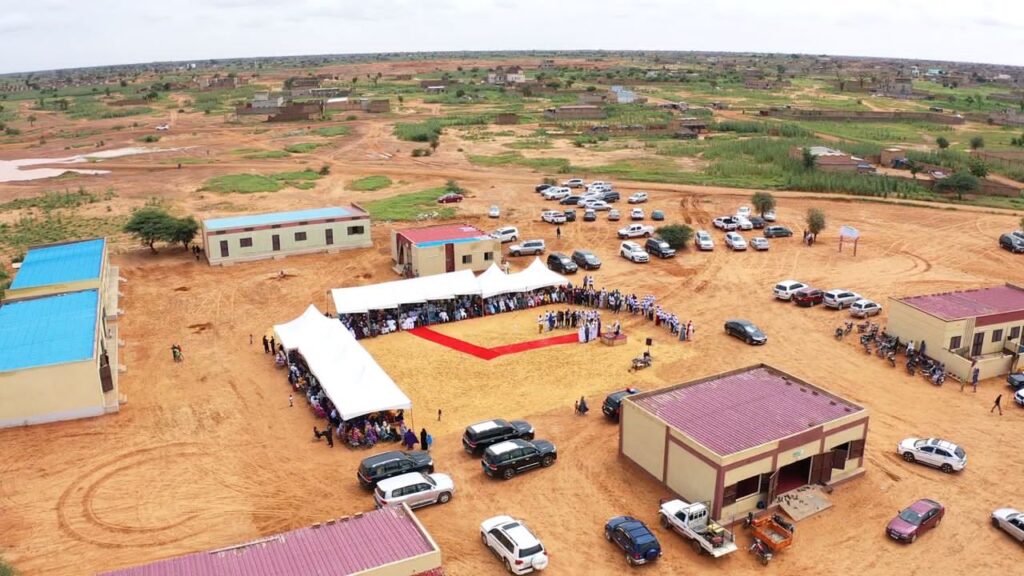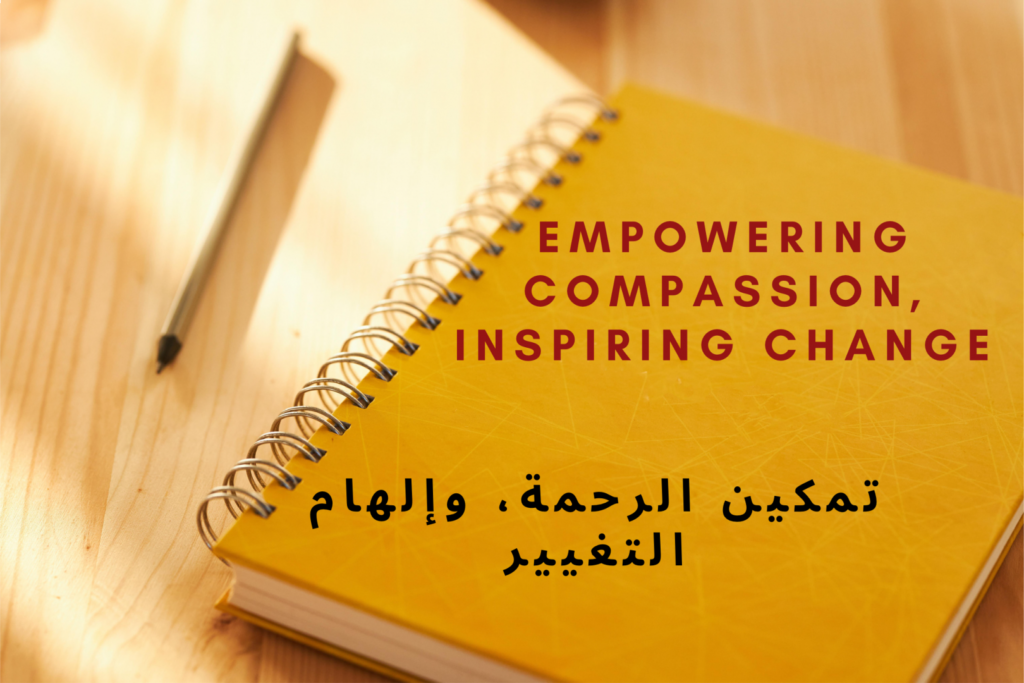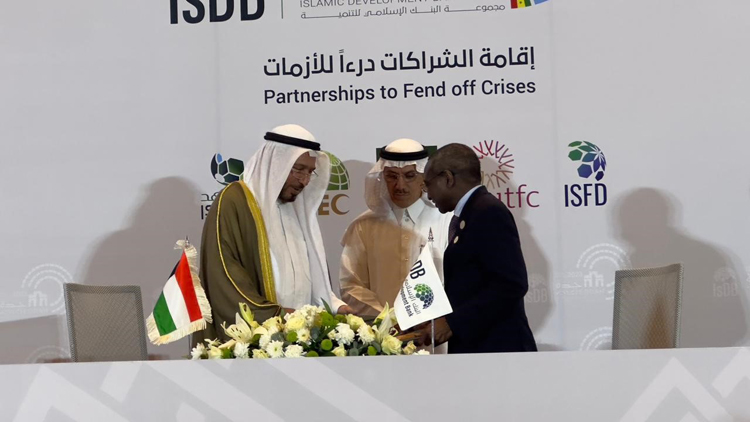Integrated Public Facilities Village within 5 Model Villages in Niamey
A new “life” for 107 Nigerien families, along with providing security, livelihood, and stability
Al-Sumait: Niger’s villages constitute an important shift in the lives of the poor within sustainable humanitarian solutions
The Organization has paid great attention to the qualitative projects for what they provide of ways of living and empowerment of humans
Many thanks and appreciation to every generous donor that gave their money to help the poor have a dignified life
Perhaps words can help count the number of accomplished homes, the number of the village’s facilities beneficiaries, the number of students attending its schools, the number of qualified people in its vocational center, and the number of visitors to its health center, etc. However, words may not express the feelings of joy and happiness that these poor villagers felt after the life of displacement, misery, and the constant search for water they had, to a life of prosperity and stability, along with increasing their feeling of security and safety.
The International Islamic Charity Organization (IICO) has established a new village with integrated facilities and services in the Nigerien Capital, Niamey, to house 107 poor families in cooperation with Al-Taakhi voluntary team. As the number of implemented projects launched by the Organization recently in Niger has reached (5) Model Villages, which succeeded in providing security, stability and dignified life for about 2,500 needy people.
The new village is located on an area of 70,000 square meters, and consists of 107 houses, a mosque that is spacious for 250 worshippers, a dispensary that includes 13 medical clinics, a nursing room and a reception hall, a school for the primary and elementary stages consisting of 9 classrooms and 3 administrative offices. As well as a vocational training center for learning sewing, an artesian well, and a water network and solar panels. The total cost of the village exceeds one million US dollars.
Each house, with an area of 50 square meters, consists of living rooms and an open yard with its main facilities.
Eng. Bader Al-Sumait, the Director General of the IICO, said, “This new village, which is named “Hayat Model Village”, had been established within the strategic vision of the IICO that mainly focuses on the developmental works that enhance the sustainability of good deeds and contributes to improving the quality of life including economic, social and educational aspects.
Al-Sumait continued, “One of these villages had been established with the support of the Late Fawzi Muhammad Abdul Mohsen Al-Kharafi, and it includes 100 housing units, a mosque, a school for the primary and middle stages for educating students. In addition to a sewing workshop for developing skills, an artesian well to provide water, and a medical clinic to provide health services for the villagers”.
As for the rest of the villages, Al-Sumait pointed out that Al–Subaie Family in Qatar had mainly established three villages, each village included, in addition to the housing units, a mosque for worship, a school for educating students. As well as a vocational center for developing youth skills, and an artesian well to provide drinking water to the villagers and to serve its main facilities.
Al-Sumait explained that Niger’s villages constitute an important shift in the lives of the poor within sustainable humanitarian solutions, noting that the residents of these villages were living in very primitive nests and huts that lacked the minimum necessities of human life.
Al-Sumait indicated that the Organization has been practicing its humanitarian and development activities from its office in Niger, since its inception in the mid-1980s through developmental, educational, social and cultural contributions, etc.
The Director General expressed his sincere thanks and appreciation to every generous donor that gave their money to help the poor have a dignified life, including housing, education, health services and work opportunities.
The IICO has paid great attention to the qualitative projects for what they provide of ways of living and empowerment of humans, leading to a dignified life that meets their needs and enhances their sense of security and safety.
It is noteworthy that Niger is one of the poorest countries in the world, with more than 63% of the population living under the poverty line, according to a report issued by UNESCO, and it is ranked the last country in the world on the UN’s Humanitarian Index according to the United Nations Development Program (UNDP) report.
Al-Taakhi Team is active in 20 Countries
Al-Taakhi Voluntary Team of the IICO began its activities in 2015 with three members, the current Head of the Team, Adel Al-Azmi , Dr. Issa Al-Anzi and Eng. Khaled Al-Rashidi. However, over time the number of volunteers has increased to 150, and the team works in more than 20 countries in Africa and Asia, including: Niger, Chad, Benin, Somalia, Mauritania, Sudan, Egypt, Mali, Senegal, Syria, Yemen, Turkey, Kyrgyzstan, Indonesia, Bangladesh, and Burma.
The team’s activities varied among providing aids, construction works and educational activities. The team is also concerned with establishing centers for learning the Holy Qur’an and teaching Islamic sciences. It seeks to sponsor orphans and poor families, and establish medical and health centers.
Cadre
An area that is characterized by abject poverty
The Village of Hayat was established in an area that is characterized by the abject poor, and its people live in primitive huts and nests that lack the simplest necessities of human life. Therefore, establishing this village was considered to be a resort for its residents, protecting them from the cold of winter, the blaze of summer, and preserving their dignity, due to the various facilities and services, provided by establishing it within an atmosphere of urbanization and societal development.
The implementation of the village took about 18 months, as the actual execution works began on March 10, 2021, under the supervision of the Organization’s main office in Niger, and the villagers received their homes on September 10, 2022.




